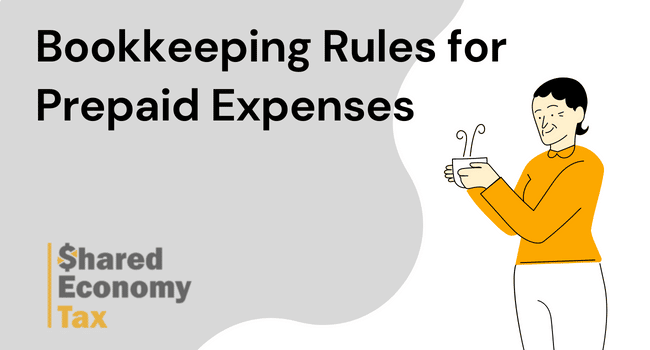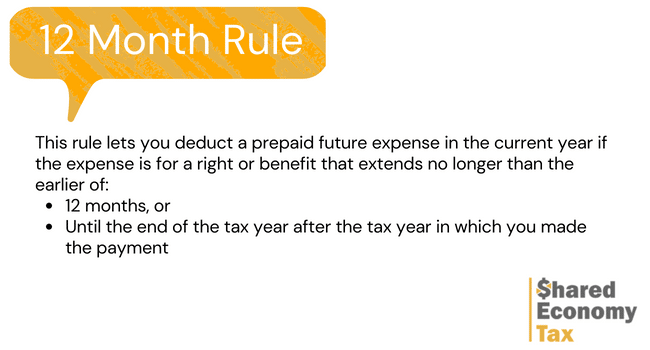Expenses on the cash basis of accounting are simple. For example, if you write a check or charge something on your credit card, you’ve created an expense. But if your business uses the accrual basis of accounting, determining when you get to deduct an expense is more complicated. When you pay expenses for future accounting periods, they are prepaid expenses. You record prepaid expenses as an asset on your company’s books, and then you allocate the expenses to different accounting periods.
What are Prepaid Expenses?
You create a prepaid expense when you pay for future expenses in advance. There are several circumstances when this might happen:
- Rent or mortgage payments paid for coming months
- Insurance policies that you pay for the year in advance
- Software expenses that you pay beforehand to get discounts
You record the payment for prepaid expenses as an asset on the balance sheet. Keep in mind that this only applies to accrual accounting. For cash basis businesses, you record the entire expense on the profit and loss statement when you make the payment.
As the benefits of the assets come to be over time, you then change the amount to an expense. For example, consider a company that is purchasing a software subscription. They can either pay $120/month or $1,200/year for the software. If they purchase the annual subscription to get the discount, they will record the $1,200 purchase as a prepaid expense. Each month, they would then record a $100 software expense to show the portion of the prepaid expense being used.
How do You Account for Prepaid Expenses
You record prepaid expenses as credits from the bank accounts when the expense is paid and debited from the bank account. Some businesses will use separate prepaid expense accounts for different types of expenses such as insurance, taxes, or rent.
As you realize the prepaid expenses, you record journal entries in your accounting software. Journal entries recognizing previously recorded expenses are typically called adjusting entries. The journal entry credits the prepaid expense account and debits the expense account.
Note that adjusting journal entries don’t record as new business transactions. Instead, they adjust previously recorded transactions.
Recording adjusting entries for prepaid expenses allows businesses to match up expenses to the accounting period when they actually incur. For this reason, accrual-based accounting tends to more accurately reflect a business’s financial performance, but it’s a much more complicated accounting system than most small businesses need.
Rules for Prepaid Expenses
Accrual accounting, including prepaid expenses, has rules you must follow.
One thing you can’t do is prepay your business expenses for a future year and then turn around and deduct the expenses from the current year’s taxes.
For example, if you decide to pay a two-year lease upfront, you are only allowed to deduct the portion of the prepaid lease payment that falls into the current year.
Note that businesses that use cash-based accounting can prepay expenses and deduct them for the current year.
The Exception to the Rules
There are some exceptions to the rules regarding prepaid expenses. For example, you can sometimes record the entire expense when you pay it.
12-month rule. This rule allows you to deduct a future prepaid expense in the current tax year if the expense is for a benefit that extends no longer than either the earlier of:
- 12 months, or
- Until the end of the tax year after the tax year when you made the payment (note that this is often the limiting factor when determining whether an expense can be fully expensed when paid)
Here are some typical applications where the 12-month rule applies.
- Business insurance premiums (if the policy ends before the end of the fiscal year)
- Business licenses
- Rents and leases
- Payments to terminate business contracts. Note that you can record the entire expense in the current period even if the contract expires in a future period.
You cannot use the 12-month rule for the following common circumstances.
- Payments for interest
- Loans or other financial interests
- Furniture, equipment, and other long-term capital asset purchases (which you usually consider fixed assets and not prepaid expenses)
Bookkeeping Details
Keeping accurate records for prepaid expenses is crucial. In the event of an audit, you will need to justify how you calculated the expenses recorded on your return.
The records for the initial payments of the prepaid are straightforward. However, it would be best if you had receipts for the payments and documentation of the charge on your credit card or bank statement.
When calculating the prepaid expenses used for each period, you should maintain spreadsheets and other paperwork that include the calculations for the expenses for each period.
For example, if you are recording the utilization of a prepaid insurance expense, your documentation should include the following:
- The date you made the initial payment
- The coverage period for the policy
- Any adjustments to the premium (such as workers comp audit results)
- The calculation for the prorated expenses for each period.
Reasons to Not Prepay Expenses
Pre-paying expenses may or may not be a worthwhile effort for your company. First and foremost, examine your business’s cash flow to see if you even have the means to prepay expenses before you sweat the decision.
Some businesses prefer to pay upfront to have fewer bills to worry about each month. Many vendors, including insurance companies, even give discounts for prepaying your bill upfront. Factor these discounts into your decision-making process to determine if prepayment is worth it.
For accrual accounting systems, prepaying an expense doesn’t necessarily mean it will come off your profit & loss statement. Typically, you can only claim these expenses when they’re utilized. Until then, they’re considered an asset, not an expense.
So, prepaying expenses to reduced your taxable income doesn’t really work for double-entry businesses because you allocate deductions when you actually incur expenses. For example, if you prepay your insurance policy, you can only claim deductions for the months that have already passed.
Final Thoughts
Prepaid expenses can trip up new business owners, especially if you use an accrual accounting system. However, allocating the expenses to the appropriate period will become second nature as you work with prepaid expenses more.
The most important thing is to maintain accurate records and backup documentation for your deductions, so you can justify your expenses in the case of an audit.
Our tax pros specialize in small business taxes and bookkeeping, and we can take prepaid expenses and other complicated accounting tasks off your plate.
Contact us today to set up a one-on-one strategy session with a Shared Economy Tax pro to see how we can help your business save on taxes and more.

